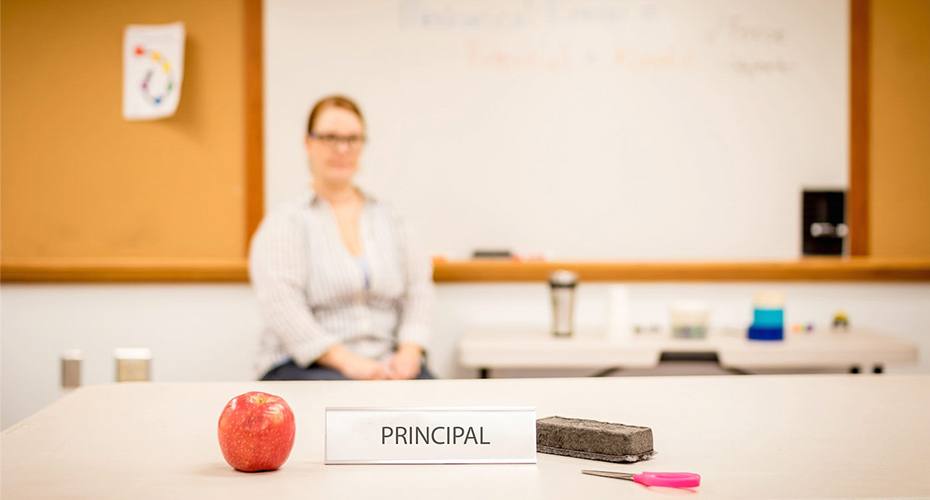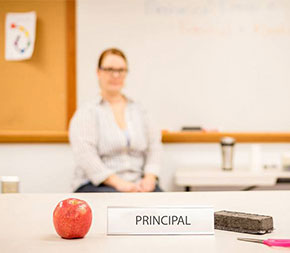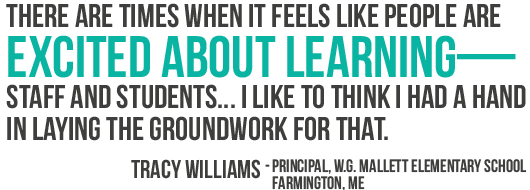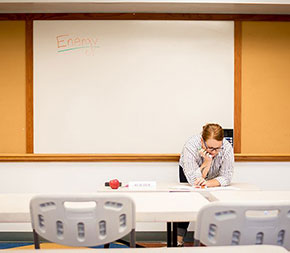How I Became an Elementary School Principal

by All Star Staff


Tracy Williams, Principal
W.G. Mallett Elementary School
Farmington, ME
Energy, tenacity and passion-Tracy Williams, principal at WG Mallett Elementary School in Farmington, Maine, will tell you that these three qualities make the best teachers. WG Mallett serves children from kindergarten through third grade, so Williams’ day is filled with kids from ages five to eight.
Discover the tricks of the trade from this experienced early childhood education principal.
An Unlikely Path to an Education Career
Williams started her career working as an assistant to a speech therapist. But her path of educational development would prove unusual. She later became a speech therapist herself and eventually went into educational leadership. She became a literacy program trainer, traveling across Maine to observe and train elementary teachers in their classroom settings.

In this role, she was able to provide teachers feedback to improve their curriculum and their interactions with students. Her confidence and desire to advance brought her success as she traveled her own fast-paced educational development path.
Becoming an ECE Principal
When she found that elementary education was lacking the quality she expected, she decided to pursue a career in elementary education after completing her Master of Arts degree in Literacy. She wanted to make a difference, and she knew that an education administration position was a great place to begin her early childhood education career.
“I’m not afraid of change,” she says, but she does realize that change is sometimes difficult. She aspires to create conditions where people want to change, learn and improve. “I try to put myself in the shoes of someone who’s been in the same place for 20 years when change occurs,” she says. “Change can be incredibly stressful to a person who’s entrenched in the way things have been for so long.”
Forging Relationships with Teachers and Students
“I try to be genuine with people,” she says. In particular, Williams works on building trust-an essential element in encouraging teachers who may feel unable, or unwilling, to change the way they teach. “I try to make the work we do together fun, inviting and non-threatening so that people feel connected.”

Her primary techniques for fostering growth in students are dialogue and time. She has found that establishing relationships with students stands as a fundamental means to creating a school where kids want to learn and where they treat teachers and fellow students with respect. In her third year as a principal at WG Mallett, she knows all 350 students by name. “It gets easier each year,” she says.
Using Development to Benefit her School
As a principal, Williams has worked with teachers to develop school-wide goals to improve the quality of instruction. She believes in developing the teachers under her with the same vigor she used in her own educational development. “When teachers advance their own education, it not only helps them grow but ultimately elevates student learning.”
But she doesn’t limit herself to just teacher education. She also utilizes school time development tactics as well. For example, teachers spend time observing one another’s classes to help build the school’s instructional goals. “I see all of the instruction in the school, and I know what we need to zero in on,” she says.
Finding Her Stride as an Education Administrator
Williams plans to remain a principal for the rest of her early childhood education career so she can continue to give back to her students and teachers. “We have lots of fun here,” she says. “Kids put a humorous spin on things. They have a great pureness about them and don’t edit what they’re going to say.”
For Williams, the greatest joy of her early childhood education career lies in its dynamic nature. “There are times when it feels like people are excited about learning-staff and students. It feels like there’s energy. I like to think I had a hand in laying the groundwork for that. We have such an opportunity here to create strong learners,” she says. “We need to seize that opportunity.”



